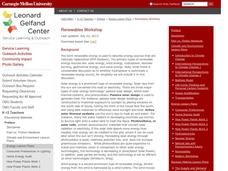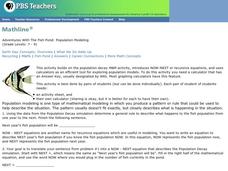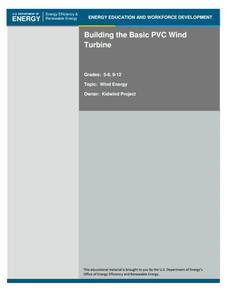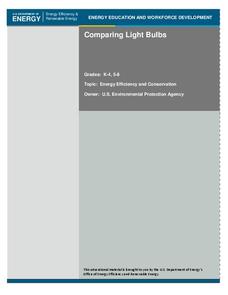Carnegie Mellon University
Ocean Acidification
After brainstorming what they know about ocean acidification, youngsters place eggs in acid to determine the effects on calcium-containing organisms, and add carbon dioxide to solutions with sea shell material to discover the impact on pH.
Carnegie Mellon University
Transportation
Teach your environmental studies, life science, or engineering class how an internal combustion engine works using the first few slides of the accompanying presentation. Then, focus in on the resulting carbon emissions. Finally, take a...
Carnegie Mellon University
Renewables Workshop
Youngsters examine resource maps to find out which states are using solar and wind power and discuss as a class various other renewable energy sources. They use a provided data table to record pros and cons to each technology, build and...
Michigan State University
Bug Lyphe!
Introduce ecology classes to biodiversity and interdependence in ecosystems with a PowerPoint presentation. Then, they get up-close and personal with the invertebrate world by collecting insects, classifying them, and graphing their...
Consortium for Ocean Science Exploration and Engagement (COSEE)
One Ocean: It Matters!
Here is the first of four poignant lessons on how humans and oceans interact, even if people live far from the coast. This particular lesson also examines studies that are taking place in Antarctica of how climate change is affecting the...
Howard Hughes Medical Institute
What is My Carbon Footprint?
Here is a lesson that walks youth through an online carbon footprint calculator produced by the University of California, Berkeley. Once learners finish inputting information, they compete a worksheet with the results. This is simple,...
Random House
Dear Mother Earth
Get those pencils ready because we are going to write a letter to our dear mother, Earth that is. Allow your youngsters to explore and express all the ways that they plan to protect Mother Earth. The worksheet is perfect for Earth Day,...
Curated OER
Earth Day Writing
Earth Day is a great topic to write about, and graphic organizers can really help learners classify their thoughts. Here is a fantastic set of themed worksheets that will allow your class to explore and write about conservation. Each...
PBS
Adventures With The Fish Pond: Population Modeling
Build up from the previous activity where your learners charted the population growth and decay of a fish pond with M&Ms®. Have them look at the data from that activity and create a Now-Next, or recursive equations, to predict the...
PBS
Population Simulation with M&M's
Math and M&Ms® go great together when introducing a modeling activity. Allow your learners to simulate population growth and decay of fish in a pond and share their reasoning for the change in fish. With such an impact we have on our...
PBS
What We Do Adds Up
With so many tons of trash going into landfills each year, your environmentalists can calculate how much the average person is tossing away. This activity has a series of questions not only requiring math, but a conscious thought of how...
PBS
A Little Recycling Goes A Long Way
Every time you purchase something from the store, it goes into a bag, but what happens to the bag? This lesson encourages your learners to think about what happens to those plastic and paper bags and their effect on the environment. Use...
Curated OER
Connect the Spheres: Earth Systems Interactions
Is everything really connected? Take your class on a walk outside, where they will make observations and write them down on a worksheet. Once they are back in the classroom, learners will work to determine if and how things like birds,...
Earth Day Network
The Neolithic Revolution
With the abundance of food products we can easily access in our society today, it is easy to forget the toll this can take on our global environment. Young learners will discover how the transition to agriculture and domesticated living...
Earth Day Network
Healthy Earth, Sick Earth
Earth is sick and needs our help! Read the children's book Planet Earth Gets Well to explain the various problems facing the planet, discussing what young conservationists can do to heal the planet along the way. A great Earth Day...
Scholastic
Study Jams! Changes in Ecosystems
Our scholarly friends head to the lake to go fishing and are unpleasantly surprised by the algae filling the water. They talk about primary and secondary succession as different ways that ecosystems are changed. Show the short video,...
Scholastic
Study Jams! Natural Resources
Use this slide show to introduce your class to some of our most useful natural resources. The text beneath the photographs differentiates between renewable and non-renewable resources. The need for conservation of resources and human...
Scholastic
Study Jams! Fossil Fuels
Eight slides introduce viewers to the wonders and woes of fossil fuels. How are they formed? How do we use them? How do they harm the environment? And how can we conserve? All of these thoughts are briefly touched upon. In addition to...
US Department of Energy
Building the Basic PVC Wind Turbine
Here is a comprehensive and well-written lesson plan that results in learners building a standard wind turbine. Once built, teens can design a variety of experiments to test different factors. This activity is a noble undertaking that...
Redefining Progress
Have and Have-Not
Is there a correlation between a country's wealth and the extent of its ecological footprint? What exactly constitutes an ecological footprint, and how does one country stack up against the rest? This is a unique lesson to incorporate...
University of Kentucky
Beneficial Bug Scavenger Hunt
Many people think of bugs as annoying pests to be squashed, but most insects and spiders are beneficial, eating the actual pests or pollinating plants. After reviewing some of the common bugs in your area (they may differ from those...
Earth Day Network
Conserving Water Through Art!
Having fresh, clean drinking water is a privilege many people take for granted. Help raise awareness about the scarcity of water and the importance of conservation by discussing different ways water is used in everyday life. Brainstorm...
Curated OER
Comparing Light Bulbs
An average home produces twice as many emissions as an average car. Teach your class how to reduce energy consumption by replacing standard incandescent light bulbs with compact fluorescent light bulbs. Perform an experiment to compare...
Baylor College
Water: Post-Assessment
Very simply, the science class will discuss what they have learned during The Science of Water unit and take a multiple-choice post-assessment quiz. A few other closing activities are suggested for you to choose from, such as having...























